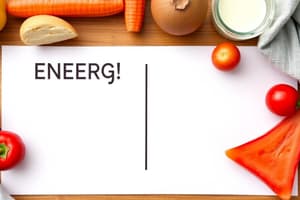Podcast
Questions and Answers
What is the principle of energy balance
What is the principle of energy balance
It states that the amount energy entering a body must be equal to the amount of energy leaving it ( plus any change in internal storage)
The principle of energy balance is based on what
The principle of energy balance is based on what
The first law of thermodynamics which states that energy can neither the created nor destroyed but can be transformed from one form to another
What is energy balance
What is energy balance
It is the relationship between energy in ( food calories taken into the body from food and drinks)and energy out ( calories being used for the daily enery requirement)
What is the energy balance equation
What is the energy balance equation
List and explain the types of energy balance
List and explain the types of energy balance
What determines or dictates is weight is loss, gained, or remains the same
What determines or dictates is weight is loss, gained, or remains the same
What is Involuntary body work
What is Involuntary body work
List examples of Involuntary body work
List examples of Involuntary body work
What is BEE basal energy expenditure
What is BEE basal energy expenditure
What is another name for BEE
What is another name for BEE
What is voluntary body work or exercise
What is voluntary body work or exercise
What is calorie
What is calorie
How many calories equal a kilocalorie
How many calories equal a kilocalorie
What is kilocalorie
What is kilocalorie
What is the international unit of energy
What is the international unit of energy
How do you convert kilocalorie to kilojoules
How do you convert kilocalorie to kilojoules
The energy needed for voluntary and involuntary body work is in what form
The energy needed for voluntary and involuntary body work is in what form
What is adenosine triphosphate
What is adenosine triphosphate
What is fuel factor
What is fuel factor
What is another name for fuel factor
What is another name for fuel factor
List the fuel factors
List the fuel factors
Flashcards
Energy Balance Principle
Energy Balance Principle
The amount of energy entering a body must equal the amount of energy leaving it, plus any change in internal storage.
Basis of Energy Balance
Basis of Energy Balance
The first law of thermodynamics, stating that energy cannot be created or destroyed, only transformed.
Energy Balance
Energy Balance
The relationship between energy intake (calories from food and drinks) and energy expenditure (calories used for daily activities).
Energy Balance Equation
Energy Balance Equation
Signup and view all the flashcards
Positive Energy Balance
Positive Energy Balance
Signup and view all the flashcards
Negative Energy Balance
Negative Energy Balance
Signup and view all the flashcards
Equal Energy Balance
Equal Energy Balance
Signup and view all the flashcards
Involuntary Body Work
Involuntary Body Work
Signup and view all the flashcards
Examples of Involuntary Body Work
Examples of Involuntary Body Work
Signup and view all the flashcards
Basal Energy Expenditure (BEE)
Basal Energy Expenditure (BEE)
Signup and view all the flashcards
Basal Metabolic Rate
Basal Metabolic Rate
Signup and view all the flashcards
Voluntary Body Work or Exercise
Voluntary Body Work or Exercise
Signup and view all the flashcards
Calorie
Calorie
Signup and view all the flashcards
Kilocalorie
Kilocalorie
Signup and view all the flashcards
Joule
Joule
Signup and view all the flashcards
Kilocalorie to Kilojoule Conversion
Kilocalorie to Kilojoule Conversion
Signup and view all the flashcards
Form of Energy for Body Work
Form of Energy for Body Work
Signup and view all the flashcards
Adenosine Triphosphate (ATP)
Adenosine Triphosphate (ATP)
Signup and view all the flashcards
Fuel Factor
Fuel Factor
Signup and view all the flashcards
Energy Density
Energy Density
Signup and view all the flashcards
Fuel Factors
Fuel Factors
Signup and view all the flashcards



